Friday, September 19, 2014
WHY DOES THE QUEBEC GOVERNMENT HATE THE JEWISH GENERAL HOSPITAL ?
ISIS FANATICS ARE SLAUGHTERING CHRISTIAN CHILDREN - THREATS EVEN IN AUSTRALIA
From: <befaithfulanglicans@gmail.com>
Date: Fri, Sep 19, 2014 at 2:40 AM
Subject: ISIS kills Christian children - please pray for parents
To: LMDeJean@gmail.com
Sep 19, 2014
These two emails from missionary friends were received, one yesterday and one this morning. Please pass it on so that as many people as possible can pray specifically for our brothers and sisters.
A friend just got a text message from her brother asking her to shower him and his parish in prayer. He is part of a mission and ISIS has taken over the town they are in today. He said ISIS is systematically going house to house to all the Christians and asking the children to denounce Jesus. He said so far not one child has. And so far all have consequently been killed. But not the parents.
The UN has withdrawn and the missionaries are on their own. They are determined to stick it out for the sake of the families – even if it means their own deaths. He is very afraid, has no idea how to even begin ministering to these families who have seen their children martyred. Yet he says he knows God has called him for some reason to be his voice and hands at this place at this time. Even so, he is begging prayers for his courage to live out his vocation in such dire circumstances. And like the children accept martyrdom if he is called to do so. She asked me to ask everyone we know to please pray for them. These brave parents instilled such a fervent faith in their children that they chose martyrdom. Please surround them in their loss with your prayers for hope and perseverance.
She was able to talk to her brother briefly by phone. She didn't say it but I believe she believes it will be their last conversation. Pray for her too. She said he just kept asking her to help him know what to do and do it. She told him to tell the families we ARE praying for them and they are not alone or forgotten — no matter what. Her e mail broke my heart. Please keep all in your prayers. Thanks
Then this came this morning… Just a few minutes ago I received the following text message on my phone from Sean Malone who leads Crisis Relief International (CRI). We then spoke briefly on the phone and I assured him that we would share this urgent prayer need with all of our contacts.
"We lost the city of Queragosh (Qaraqosh). It fell to ISIS and they are beheading children systematically. This is the city we have been smuggling food too. ISIS has pushed back Peshmerga (Kurdish forces) and is within 10 minutes of where our CRI team is working. Thousands more fled into the city of Erbil last night. The UN evacuated it's staff in Erbil. Our team is unmoved and will stay. Prayer cover needed!"
Please pray sincerely for the deliverance of the people of Northern Iraq from the terrible advancement of ISIS and its extreme Islamic goals for mass conversion or death for Christians across this region. May I plead with you not to ignore this email. Do not forward it before you have prayed through it. Then send it to as many people as possible. Send it to friends and Christians you may know. Send it to your prayer group. Send it to your pastor and phone him/her to pray on Sunday during the service – making a special time of prayer for this. We need to stand in the gap for our fellow Christians.
...............................................................
AUSTRALIA
CHURCH-goers in Sydney's west have been left shaken after a stranger shouted death threats from a car bearing the Islamic State flag.
The car drove past Our Lady of Lebanon Church at Harris Park on Tuesday and witnesses claim it had a flag similar to those brandished by Islamic State jihadists hanging out the window.
A priest from the church told AAP the people in the car threatened to "kill the Christians" and slaughter their children. "They were strong words and people were scared of what they saw," he said.
Witnesses told police there was a small triangular flag placed out the window with Arabic words similar to "there is only one god and Muhammad is the prophet".
Rosehill police Inspector Brian Jackson confirmed "some threats were made in regard to some people" near the church.
Maronite Catholic parish priest Monsignor Shora Maree contacted police ahead of the church's 7pm mass on Wednesday night.
Officers were sent down to patrol the Harris Park church while hundreds took part in mass inside.
It's understood detectives are looking into who is behind the threats.
Thursday, September 18, 2014
SHOPPING FOR A PET - A WAKE UP CALL FOR IDIOTS
Wednesday, September 17, 2014
GIRLS RAPED AT COLUMBIA UNIVERSITY, U.S.A. - RAPE IS OKAY - EVEN IN AMERICA
Young women raped at Columbia University in the U.S.A. blame school authorities and police for aiding their rapists. They will not be silent. Neither should we. Silence implies consent and, by our silence, we make ourselves accomplices to the heinous criminals who enjoy the protection of "The System". They are such nice boys. So what if they enjoy a little fun? That is "The System" our society supports.
Slavery is now frowned on.
Women have the right to vote.
But RAPE is still okay.
Phyllis Carter
Transcript
This is a rush transcript. Copy may not be in its final form.
AMY GOODMAN: We're speaking with Emma Sulkowicz, a Columbia University senior who says she'll carry a dorm room mattress with her everywhere on campus until her rapist is expelled or leaves campus on his own. Emma Sulkowicz is not alone. On Friday, hundreds of students turned out to a rally carrying mattresses of their own, chanting "Carry that weight!" a reference to the emotional burden they say all survivors must carry each day. In front of Low Library at Columbia University in a speak-out that lasted hours, many shared stories of violence, injustice and healing. This is just some of their voices.
STUDENTS: Carry that weight! Carry that weight! Carry that weight! Carry that weight!
SIERRA: Sierra. I'm a freshman here at Columbia. And for the past two weeks, I've been meeting with deans and advisers in different environments, and they've been telling me how they can help me get a job, how they can help me study abroad. How are you going to help end sexual assault on my campus? Why is it more likely for me to be raped at this college than it was for me to get into this college?
ALICE: My name is Alice. I'm a junior at Barnard. To graduate from Columbia College, you need to pass a swim test or take a beginner's swim class. I don't get why Columbia's administration doesn't uphold consent—enthusiastic, continuous, retractable, noncoerced consent—as a Columbia requirement. My assaulter graduated. My friend's rapist graduated. I guess not being a rapist isn't a graduation requirement, unlike knowing how to swim. Knowing how to breast stroke for three laps isn't going to keep me from drowning when I see my rapists on campus or their name on a class roster or when you run into them in an elevator. Columbia, where rapists walk away with diplomas, but you can't graduate unless you pass the swim test.
DOROTHY: Hi, I'm Dorothy. I'm a freshman. I've been on this campus for two weeks, and I was sexually assaulted six days ago. And no one tells you where to go from there, so...
JEN: Jen. My first year here on campus at Barnard College, I was raped. Unlike the vast majority of students who are raped on this campus, I was not raped in a dorm or in a party or on campus, but off campus. I quickly went into something of a spiral, where I couldn't sleep at night and I could only sleep during the day. And I started having trouble in my classes, and I started having my grades slip. And it became an issue, and I went to speak to the dean of students at Barnard, a woman, a women's college, and I told her what had happened to me. And she looked at me with a sad expression and said, "You went where we tell our girls never to go." The idea that she would both victim-blame me and invoke the most racist stereotypes of how sexual assault happens, at the same time, says everything about what this university represents. This was 22 years ago. And what has changed?
http://www.democracynow.org/2014/9/16/we_will_not_be_silenced_students
LITTLE VIRGINS FOR SALE - MOTHERS SELL THEIR DAUGHTERS INTO SEX SLAVERY -
Phnom Penh, Cambodia (CNN)
When a poor family in Cambodia fell afoul of loan sharks, the mother asked her youngest daughter to take a job. But not just any job.
The girl, Kieu, was taken to a hospital and examined by a doctor, who issued her a "certificate of virginity." She was then delivered to a hotel, where a man raped her for two days.
Kieu was 12 years old.
"I did not know what the job was," says Kieu, now 14 and living in a safehouse. She says she returned home from the experience "very heartbroken." But her ordeal was not over.
After the sale of her virginity, her mother had Kieu taken to a brothel where, she says, "they held me like I was in prison."
She was kept there for three days, raped by three to six men a day. When she returned home, her mother sent her away for stints in two other brothels, including one 400 kilometers away on the Thai border. When she learned her mother was planning to sell her again, this time for a six-month stretch, she realized she needed to flee her home.
"Selling my daughter was heartbreaking, but what can I say?" says Kieu's mother, Neoung, in an interview with a CNN crew that travelled to Phnom Penh to hear her story.
Karaoke bars are a common front for child prostitution. Mira Sorvino details going behind the scenes of this illicit trade.
Like other local mothers CNN spoke to, she blames poverty for her decision to sell her daughter, saying a financial crisis drove her into the clutches of the traffickers who make their livelihoods preying on Cambodian children.
"It was because of the debt, that's why I had to sell her," she says. "I don't know what to do now, because we cannot move back to the past."
It is this aspect of Cambodia's appalling child sex trade that Don Brewster, a 59-year-old American resident of the neighborhood, finds most difficult to countenance.
"I can't imagine what it feels like to have your mother sell you, to have your mother waiting in the car while she gets money for you to be raped," he says. "It's not that she was stolen from her mother -- her mother gave the keys to the people to rape her."
Brewster, a former pastor, moved from California to Cambodia with wife Bridget in 2009, after a harrowing investigative mission trip to the neighborhood where Kieu grew up -- Svay Pak, the epicenter of child trafficking in the Southeast Asian nation.
"Svay Pak is known around the world as a place where pedophiles come to get little girls," says Brewster, whose organization, Agape International Missions (AIM), has girls as young as four in its care, rescued from traffickers and undergoing rehabilitation in its safehouses.
In recent decades, he says, this impoverished fishing village – where a daughter's virginity is too often seen as a valuable asset for the family – has become a notorious child sex hotspot.
"When we came here three years ago and began to live here, 100% of the kids between 8 and 12 were being trafficked," says Brewster. The local sex industry sweeps up both children from the neighborhood -- sold, like Kieu, by their parents – as well as children trafficked in from the countryside, or across the border from Vietnam. "We didn't believe it until we saw vanload after vanload of kids."
Weak law enforcement, corruption, grinding poverty and the fractured social institutions left by the country's turbulent recent history have helped earn Cambodia an unwelcome reputation for child trafficking, say experts.
UNICEF estimates that children account for a third of the 40,000-100,000 people in the country's sex industry.
Svay Pak, a dusty shantytown on the outskirts of the Cambodian capital Phnom Penh, is at the heart of this exploitative trade.
As one of the most disadvantaged neighborhoods in one of Asia's poorest countries – nearly half the population lives on less than $2 per day -- the poverty in the settlement is overwhelming. The residents are mostly undocumented Vietnamese migrants, many of whom live in ramshackle houseboats on the murky Tonle Sap River, eking out a living farming fish in nets tethered to their homes.
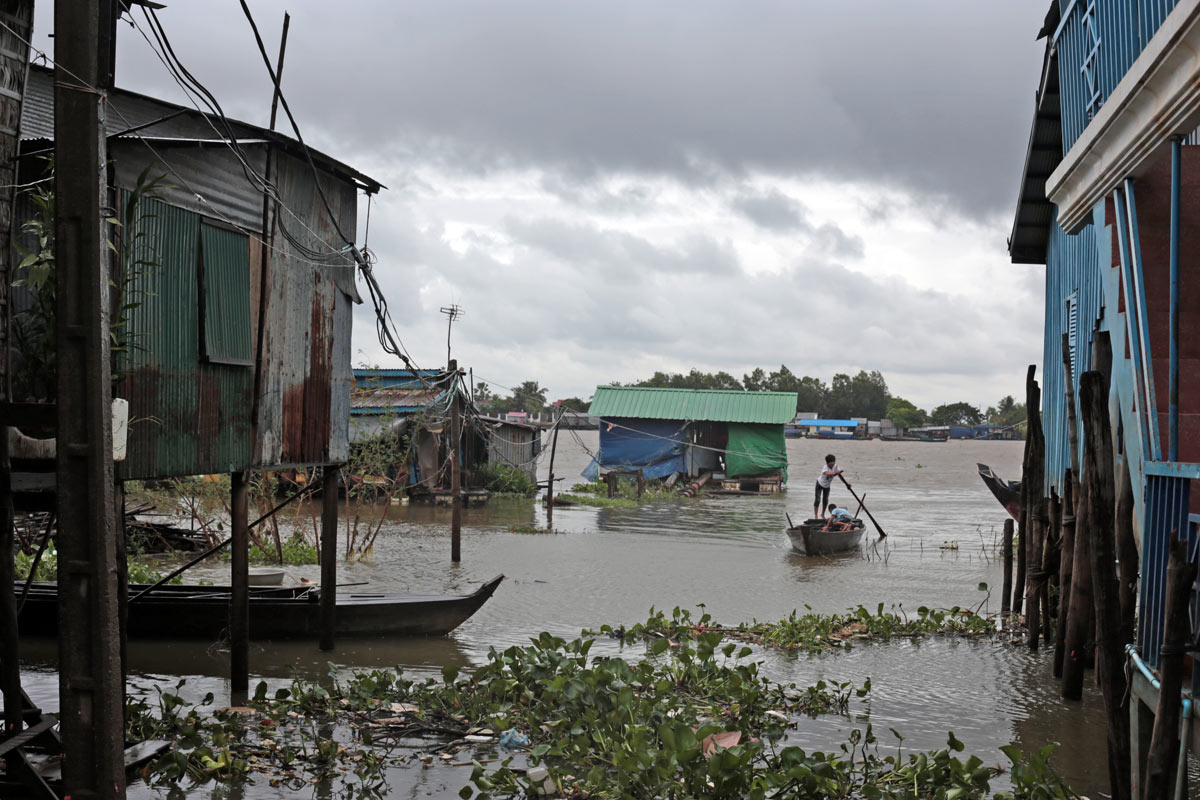
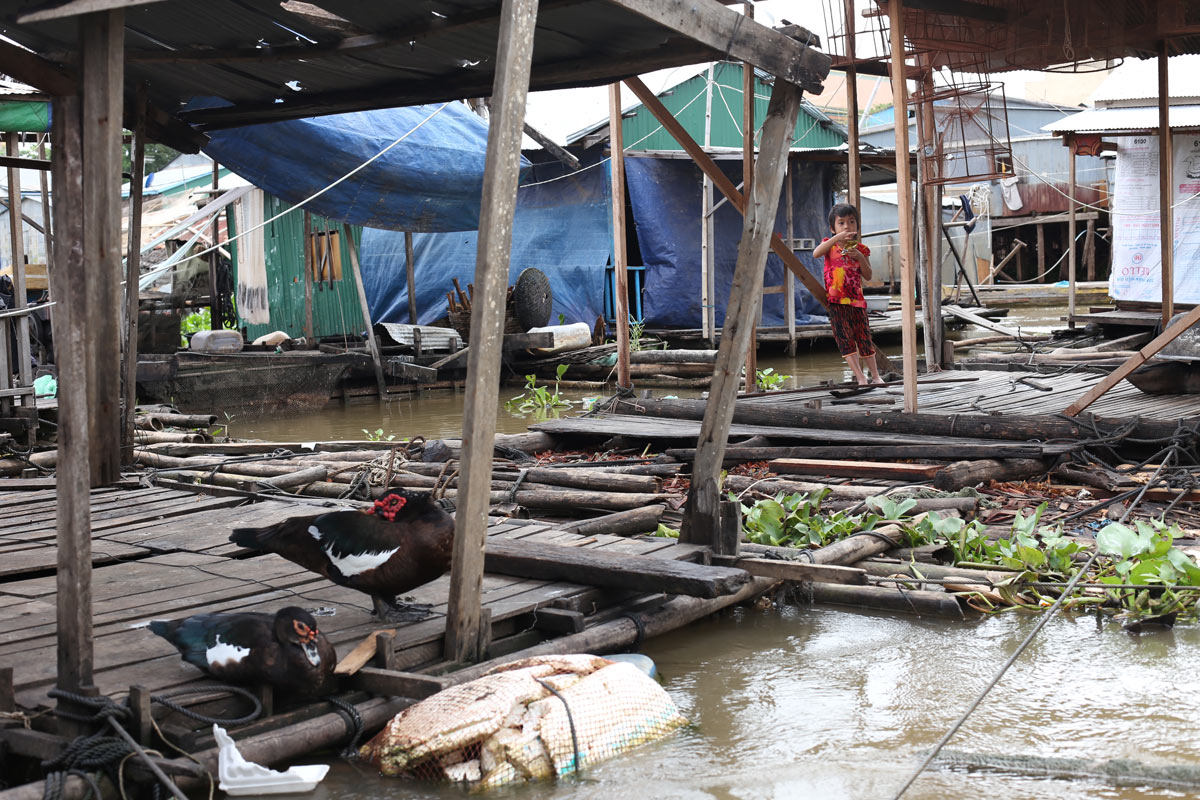
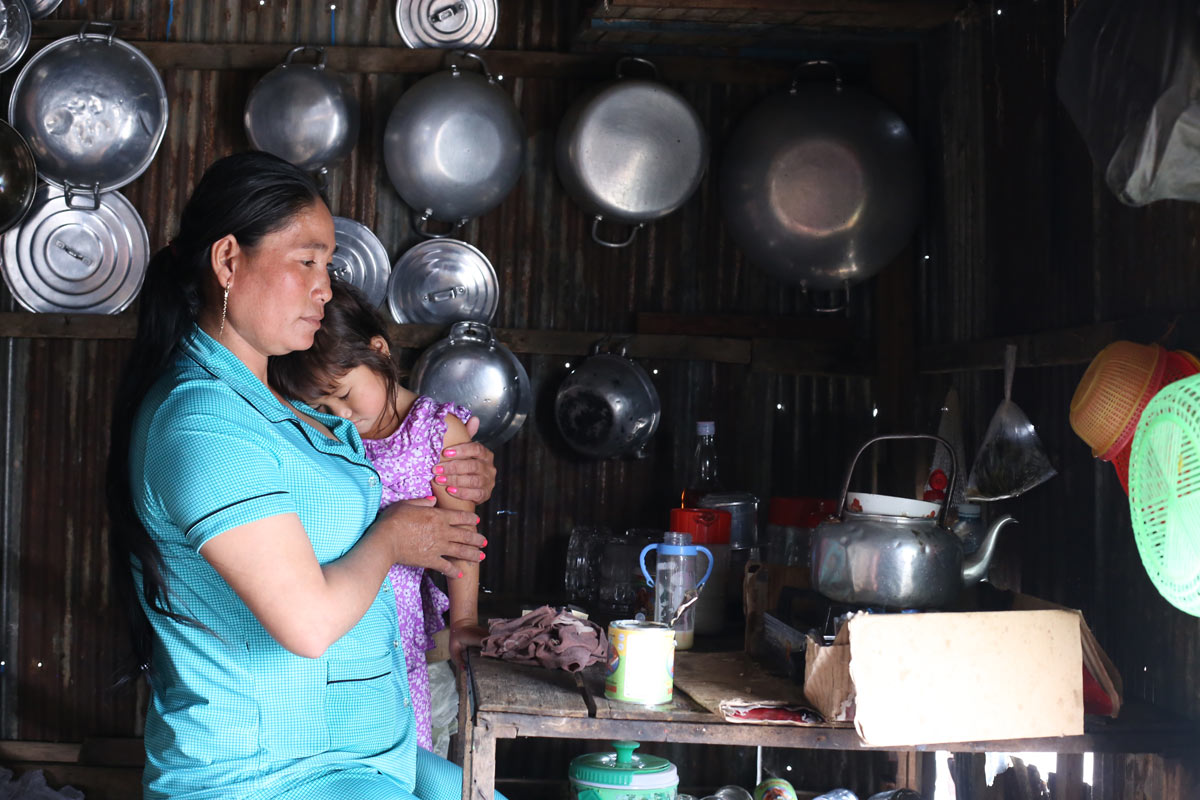
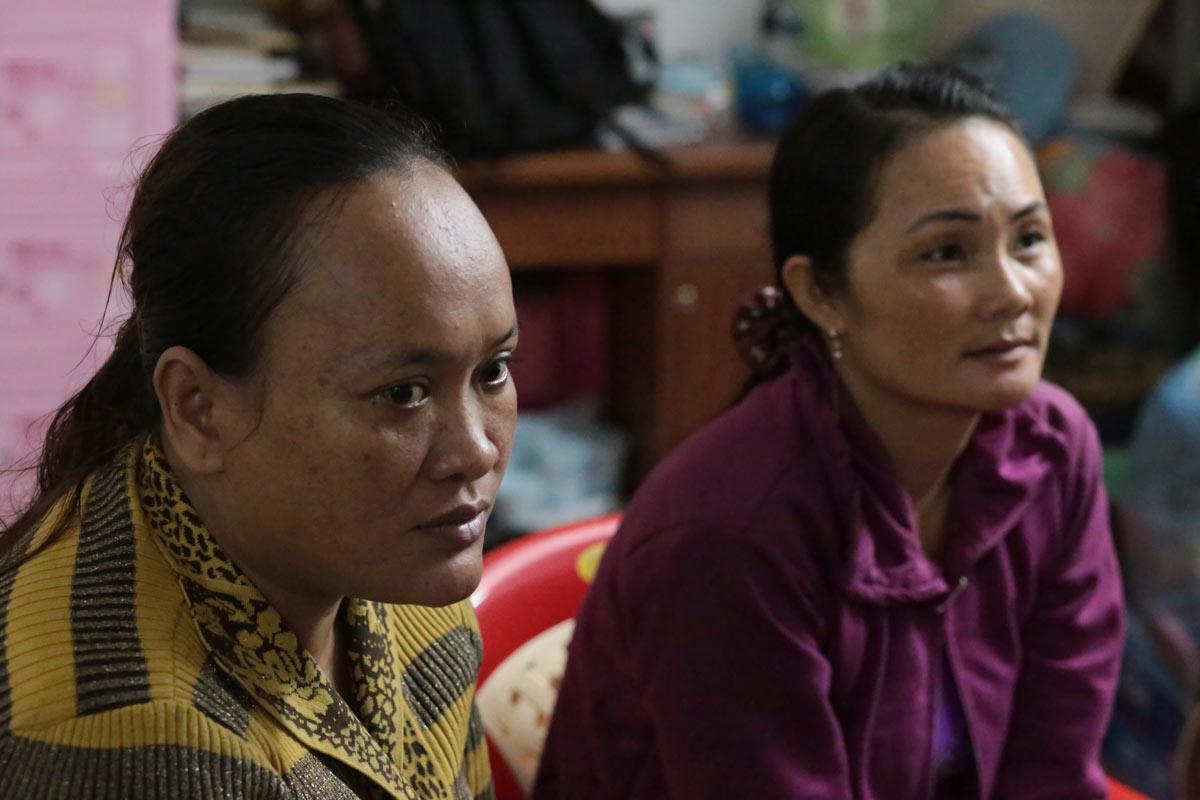
It's a precarious existence. The river is fickle, the tarp-covered houseboats fragile. Most families here scrape by on less than a dollar a day, leaving no safety net for when things go wrong – such as when Kieu's father fell seriously ill with tuberculosis, too sick to maintain the nets that contained their livelihood. The family fell behind on repayments of a debt.
In desperation, Kieu's mother, Neoung, sold her virginity to a Cambodian man of "maybe more than 50," who had three children of his own, Kieu says. The transaction netted the family only $500, more than the $200 they had initially borrowed but a lot less than the thousands of dollars they now owed a loan shark.
So Neoung sent her daughter to a brothel to earn more.
"They told me when the client is there, I have to wear short shorts and a skimpy top," says Kieu. "But I didn't want to wear them and then I got blamed." Her clients were Thai and Cambodian men, who, she says, knew she was very young.
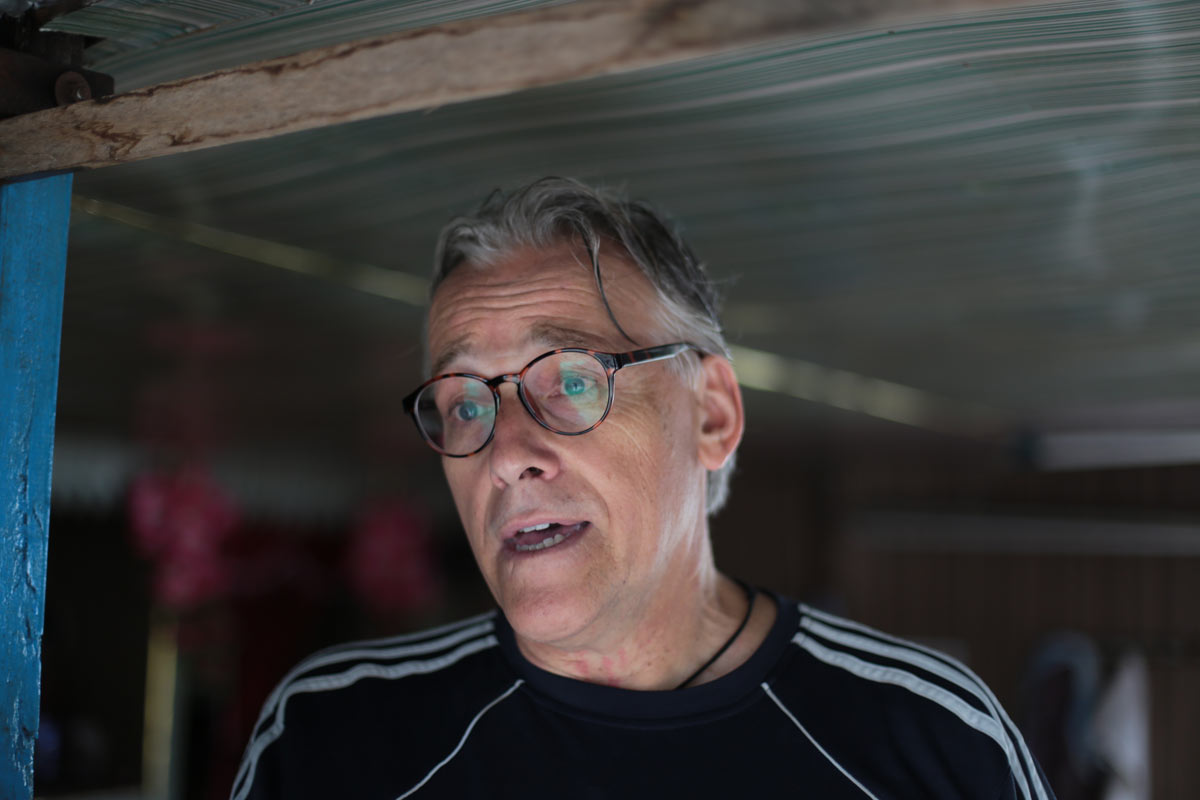
"When they sleep with me, they feel very happy," she says. "But for me, I feel very bad."
The men who abuse the children of Svay Pak fit a number of profiles. They include pedophile sex tourists, who actively seek out sex with prepubescent children, and more opportunistic "situational" offenders, who take advantage of opportunities in brothels to have sex with adolescents.
Sex tourists tend to hail from affluent countries, including the West, South Korea, Japan and China, but research suggests Cambodian men remain the main exploiters of child prostitutes in their country.
Mark Capaldi is a senior researcher for Ecpat International, an organization committed to combating the sexual exploitation of children.
"In most cases when we talk about child sexual exploitation, it's taking place within the adult sex industry," says Capaldi. "We tend to often hear reports in the media about pedophilia, exploitation of very young children. But the majority of sexual exploitation of children is of adolescents, and that's taking place in commercial sex venues."
The abusers would often be local, situational offenders, he says. Research suggests some of the Asian perpetrators are "virginity seekers," for whom health-related beliefs around the supposedly restorative or protective qualities of virgins factor into their interest in child sex.
Whatever the profile of the perpetrator, the abuse they inflict on their victims, both girls and boys, is horrific. Trafficked children in Cambodia have been subjected to rape by multiple offenders, filmed performing sex acts and left with physical injuries -- not to mention psychological trauma -- from their ordeals, according to research.
In recent years, various crackdowns in Svay Pak have dented the trade, but also pushed it underground. Today, Brewster says, there are more than a dozen karaoke bars operating as brothels along the road to the neighborhood, where two years ago there was none. Even today, he estimates a majority of girls in Svay Park are being trafficked.
Kieu's relative, Sephak, who lives nearby, is another survivor. (CNN is naming the victims in this case at the request of the girls themselves, as they want to speak out against the practice of child sex trafficking.)
Sephak was 13 when she was taken to a hospital, issued a certificate confirming her virginity, and delivered to a Chinese man in a Phnom Penh hotel room. She was returned after three nights. Sephak says her mother was paid $800.
"When I had sex with him, I felt empty inside. I hurt and I felt very weak," she says. "It was very difficult. I thought about why I was doing this and why my mom did this to me." After her return, her mother began pressuring her daughter to work in a brothel.
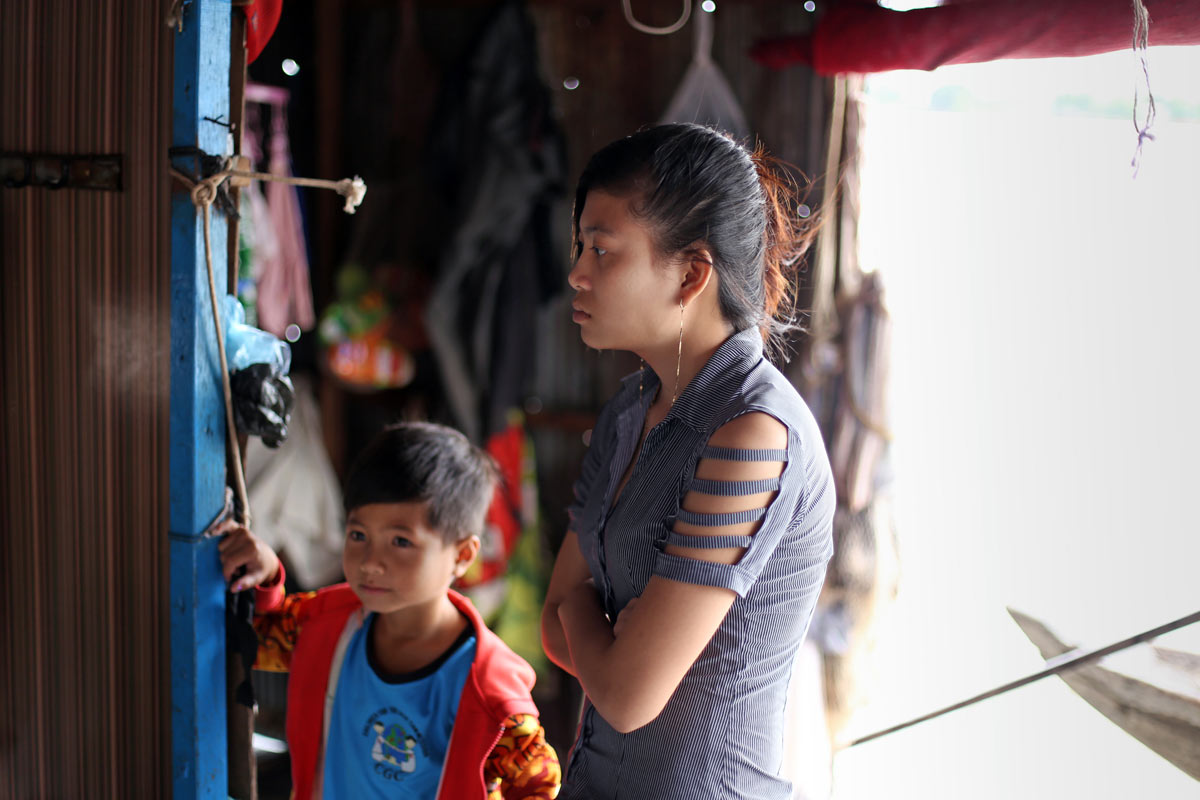
Toha listens to her mother explain how she came to sell her to sex traffickers. She no longer lives with her family, opting instead to live in a residence for trafficking survivors run by Brewster's organization -- but still provides her family some financial support from her new job.
Not far away from Sephak's family home, connected to the shore via a haphazard walkway of planks that dip beneath the water with each footfall, is the houseboat where Toha grew up.
The second of eight children, none of whom attend school, Toha was sold for sex by her mother when she was 14. The transaction followed the same routine: medical certificate, hotel, rape.
About two weeks after she returned to Svay Pak, she says, the man who had bought her virginity began calling, requesting to see her again. Her mother urged her to go. The pressure drove her to despair.
"I went to the bathroom and cut my arms. I cut my wrists because I wanted to kill myself," Toha says. A friend broke down the door to the bathroom and came to her aid.
CNN met with the mothers of Kieu, Sephak and Toha in Svay Pak to hear their accounts of why they chose to expose their daughters to sexual exploitation.
Kieu's mother, Neoung, had come to Svay Pak from the south of the country in search of a better life when Kieu was just a baby. But life in Svay Pak, she would learn, wasn't easy.
How has this Southeast Asian nation become a hotspot for pedophiles? Poverty, corruption and a brutal reign of terror have all played a part in making Cambodian children vulnerable to adult predators.
When her husband's tuberculosis rendered him too sick to properly maintain the nets on the family's fish pond, the family took on a $200 loan at extortionate rates from a loan shark. It has now ballooned to more than $9,000. "The debt that my husband and I have is too big, we can't pay it off," she says. "What can you do in a situation like this?"
"Virginity selling" was widespread in the community, and Neoung saw it as a legitimate option to make some income. "They think it is normal," she says. "I told her, 'Kieu, your dad is sick and can't work… Do you agree to do that job to contribute to your parents?'"
"I know that I did wrong so I feel regret about it, but what can I do?" she says. "We cannot move back to the past."
But she adds she would never do it again.
Sephak's mother, Ann, has a similar story. Ann moved to Svay Pak when her father came to work as a fish farmer. She and her husband have serious health problems.
"We are very poor, so I must work hard," she says. "It's still not enough to live by and we're sick all the time."
The family fell on hard times. When a storm roared through the region, their house was badly damaged, their fish got away, and they could no longer afford to eat. In crisis, the family took out a loan that eventually spiraled to about $6000 in debt, she says.
With money-lenders coming to her home and threatening her, Ann made the decision to take up an offer from a woman who approached her promising big money for her daughter's virginity.
"I saw other people doing it and I didn't think it through," she says. "If I knew then what I know now, I wouldn't do that to my daughter."
On her houseboat, as squalls of rain lash the river, Toha's mother Ngao sits barefoot before the television taking pride of place in the main living area, and expresses similar regrets. On the wall hangs a row of digitally enhanced portraits of her husband and eight children. They are dressed in smart suits and dresses, superimposed before an array of fantasy backdrops: an expensive motorcycle, a tropical beach, an American-style McMansion.
Life with so many children is hard, she says, so she asked her daughter to go with the men.
She would not do the same again, she says, as she now has access to better support; Agape International Missions offers interest-free loan refinancing to get families out of the debt trap, and factory jobs for rescued daughters and their mothers.

Mira Sorvino details her week spent in Cambodia with the CNN Freedom Project meeting victims, government officials and activists working to end child sex trafficking.
The news of Ngao's betrayal of her daughter has drawn mixed responses from others in the neighborhood, she says. Some mock her for offering up her daughter, others sympathize with her plight. Some see nothing wrong with she did at all.
"Some people say 'It's OK -- just bring your daughter (to the traffickers) so you can pay off the debt and feel better,'" says Ngao.
Not long after her suicide attempt, Toha was sent to a brothel in southern Cambodia. She endured more than 20 days there, before she managed to get access to a phone, and called a friend. She told the friend to contact Brewster's group, who arranged for a raid on the establishment.
Although children can be found in many brothels across Cambodia -- a 2009 survey of 80 Cambodian commercial sex premises found three-quarters offering children for sex – raids to free them are infrequent.
The country's child protection infrastructure is weak, with government institutions riven with corruption. Cambodia's anti-trafficking law does not even permit police to conduct undercover surveillance on suspected traffickers. General Pol Phie They, the head of Cambodia's anti-trafficking taskforce set up in 2007 to address the issue, says this puts his unit at a disadvantage against traffickers.
"We are still limited in prosecuting these violations because first, we lack the expertise and second, we lack the technical equipment," he says. "Sometimes, we see a violation but we can't collect the evidence we need to prosecute the offender."
He admits that police corruption in his country, ranked 160 of 175 countries on Transparency International's Corruption Perceptions Index, is hampering efforts to tackle the trade in Svay Pak. "Police in that area probably do have connections with the brothel owners," he concedes.
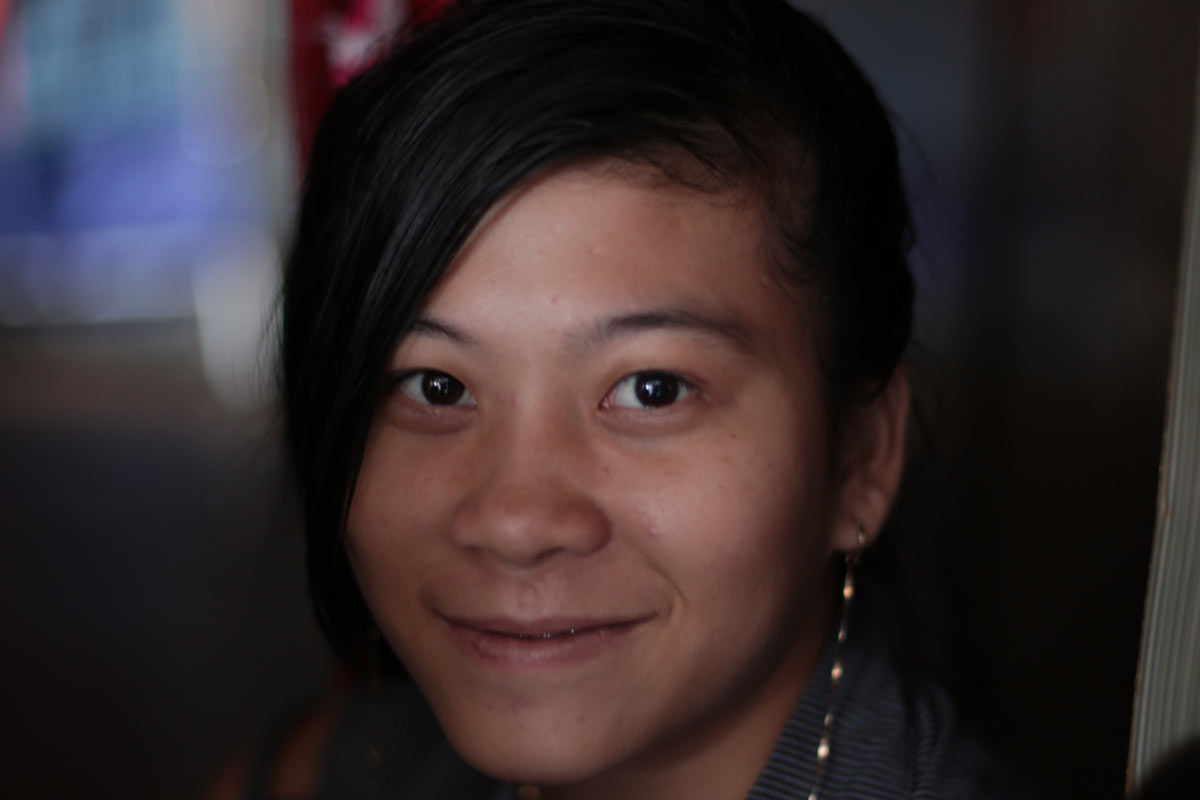
Brewster believes that corruption was to blame for nearly thwarting Toha's rescue. In October 2012, after Toha's call for help, AIM formulated plans with another organization to rescue the teen, and involved police.
"We get a warrant to shut the place down," recalls Brewster. "Fifteen minutes later, Toha calls and says, 'I don't know what happened, the police just came with the owner and took us to a new place. I'm locked inside and don't know where I am.'"
Fortunately the rescue team were able to establish Toha's new location, and she and other victims were freed and the brothel managers arrested – although not before the owners fled to Vietnam.
Toha's testimony against the brothel managers, however, resulted in their prosecutions.
Last month, at the Phnom Penh Municipal Courthouse, husband and wife Heng Vy and Nguyeng Thi Hong were found guilty of procuring prostitution and sentenced to three years in jail. Both were ordered to pay $1,250 to the court, $5,000 to Toha, and smaller sums to three other victims.
Brewster was in court to watch the sentencing; a small victory in the context of Cambodia's child trafficking problem, but a victory nonetheless.
"Toha's an amazingly brave girl," he says on the courthouse steps, shortly after the brothel managers were led down to the cells.
"Getting a telephone when she's trapped in a brothel to call for help, to saying she would be a witness in front of the police…. She stood up and now people are going to pay the price and girls will be protected. What it will do is bring more Tohas, more girls who are willing to speak, places shut down, bad guys put away."
Like the other victims, Toha now lives in an AIM safehouse, attending school and supporting herself by weaving bracelets, which are sold in stores in the West as a way of providing a livelihood to formerly trafficked children.
In the eyes of the community, having a job has helped restore to the girls some of the dignity that was stripped from them by having been sold into trafficking, says Brewster.
It has also given them independence from their families -- and with that, the opportunity to build for themselves a better reality than the one that was thrust on them. Now Sephak has plans to become a teacher, Kieu a hairdresser.
For her part, Toha still has contact with her mother – even providing financial support to the family through her earnings – but has become self-reliant. She wants to be a social worker, she says, helping girls who have endured the same hell she has.
"(Toha)'s earning a good living and she has a dream beyond that, you know, to become a counselor and to be able to help other girls," says Brewster. "You see the transformation that's happened to her."
For more, visit CNN's Freedom Project blog »
http://www.cnn.com/interactive/2013/12/world/cambodia-child-sex-trade/
RAPE IS RAMPANT IN INDIA

Rape is becoming so widespread in India that many women despair of ever getting any justice. The problem is deeply rooted in India's predominantly Hindu religion and culture.
India has never been a safe place for women but it is now becoming exceedingly dangerous as beastly men prowl the streets and attack women not only to rob but also to gang-rape them. Rape has become one of the most serious challenges facing women in India, including foreign tourists.
In the latest case, a four-year-old Iranian girl holidaying with her mother was raped by a 32-year-old man in Goa. A predominantly Christian area, Goa, a former Portuguese colony, is also notorious for drugs but it would be wrong to conclude that it is the only dangerous place in India.
The Iranian child was raped on January 22 in the northern village of Arpora, where the rapist lived and where the Iranians were staying for their holidays. The young girl told her mother about the attack several days later; the girl's mother promptly lodged a complaint with the police leading to the arrest of the rapist on January 27. Police inspector Paresh Naik announced the arrest the following day. "Police began search operations immediately and nabbed him," despite the man's attempts to escape on learning of the complaint, Naik said.
Rape of the four-year-old Iranian girl occurred the same day as a 22-year-old Indian woman was gang-raped by 13 men in the Birbum district of West Bengal. The village council ordered her to be raped because she was accused of having a relationship with a man outside her tribe. Fearing for her life, the woman escaped from her village and sought refuge elsewhere. "The girl wants to go to another village where her uncle lives in the same district," said Shashi Panja, the West Bengal Women and Child Welfare Minister. "She is scared of going back to the village where she was gang-raped since the villagers there do not want her back. The girl's family is also under protection of the police now."
According to police sources, the 13 men have been arrested. The gang-rape victim took the unusual step (by Indian standards) of lodging a complaint with the police. She was taken to a hospital in Birbhum for medical examination where the doctors confirmed that she had been raped. The news caused outrage in India as well as abroad.
Statistics compiled by police show that there are more than 24,000 rape cases in India each year. Social workers and people involved in women's issues say these are grossly underreported figures. Most women do not report rape for fear of bringing shame to the family or being ostracized by it or even the village where they live.
Last month witnessed a string of rape attacks against women, both Indian and foreign. The case of a 51-year-old Danish tourist who lost her way to her hotel in Delhi and sought direction from a group of homeless men in the early evening of January 14 made international headlines. Instead of directing her to the hotel, the Dutch tourist was assaulted by six men and gang-raped for three hours. She was also robbed of all cash and her cell phone. The attack occurred in a wooded area on the grounds of the Railway Officers Club on State Entry Road in the heart of Delhi.
She returned to her hotel deeply traumatized. The hotel receptionist told the media that she returned in a very bad state and asked for 200 rupees to give to the taxi driver. She then revealed what had happened. The victim refused to be medically examined but was clearly traumatized by the experience. She gave a detailed statement to the police in the presence of the Danish ambassador Freddy Svane. She immediately left India. The Delhi police said they had identified and arrested a group of young men in relation to the gang-rape.
The Danish tourist's rape was preceded by that of a Polish woman who was drugged and raped by a taxi driver last month while traveling with her two-year-old daughter to Delhi. Rape cases occur in all parts of India with Delhi getting greater attention because of the presence of most media outlets. For instance, last month, eight men in the eastern city of Ranchi raped a schoolgirl while they tied down her male friend, according to a report in the Hindustan Times of January 15. Last December, a judge sentenced three Nepalese men to 20 years in jail for the gang-rape of a US tourist in June in the northern state of Himachal Pradesh. In July, six men were sentenced to life in prison for the gang-rape and robbery of a 39-year-old Swiss woman cyclist who had been holidaying in the state of Madhya Pradesh.
The case that sent shockwaves across India and around the world was the rape of a female student in December 2012. When the female student and her male companion boarded a bus in Delhi late one night, both were brutally beaten and several men repeatedly raped her on the bus. She was also raped with a metal rod causing extremely serious internal injuries leading to her death. Massive protests erupted across India and vigils were held for the girl for several weeks. People demanded the death penalty for the perpetrators, who were arrested from Delhi's slums.
Indians from all walks of life marked the first anniversary of her death in December 2013 to ensure it is not forgotten. Her case has become something of a cause célèbre worldwide but has done little to address the real problem of the degrading treatment of women in India. Calls for tougher legislation against rape have gone unanswered because many members of parliament are themselves guilty of such behaviour. They sit in parliament without anyone able to touch them.
In Hindu culture, women are treated in a very degrading manner. Many are forced into prostitution in Hindu temples and given the fancy title of Devdasis (meaning female goddesses). Such women are used for the priests' sexual pleasures. Hindu religion itself revolves around erotic symbols with women's naked bodies prominently displayed.
There is an even more gruesome aspect of Hindu culture: widows forced to burn themselves on the funeral pyer of their dead husband. It is referred to as sati. This long-standing Hindu practice of widow burning was banned by British colonial administrators in 1829 but has continued to be practiced in remote villages in India.
The case of 18-year-old Roop Kanwar made international headlines in 1987. On September 4, she was forced to immolate herself on the funeral pyer of her husband at Deorala village of Sikar district in Rajasthan state. At the time of her death, she was 18 years old and had been married for eight months to Maal Singh Shekhawat, who had died a day earlier at age 24, according to a report in the New York Times (September 20, 1987). Eyewitnesses reported that Kanwar was pushed into the fire by attendees despite her screams and desperate attempts to flee the fire.
Several thousand people attended the sati event. After her death, Roop Kanwar was hailed as a sati mata — a "sati" mother, or pure mother. The event quickly produced a public outcry in urban centres, pitting modern Indians against traditional ones indulging in such barbaric practice. The incident led first to state level laws to prevent such incidents, then to the central government's Commission of Sati (Prevention) Act. Such laws have not prevented sati from occurring in remote villages to this day although such incidents have become rare.
The outcry against Kanwar's sati led to the arrest of 45 people who were charged with murder. After a trial lasting several months, they were all acquitted. A subsequent inquiry resulted in the arrest of 11 people including state politicians who were charged with glorification of sati. Yet on January 31, 2004, a court in Jaipur acquitted all the 11 accused. Even the courts are complicit in such crimes.
The case of the Indian village council ordering the rape of a girl for having a relationship with a man from a different tribe points to the low esteem in which girls and women are held in India. No boy would be similarly charged or humiliated.
Regrettably, this aspect of Indian culture has not received sufficient attention internationally. Indian-doting Western journalists look the other way despite such horrible mistreatment of women in India. Even when western tourists are assaulted and raped, their story quickly disappears from the front pages. Why is India treated with such deference?
GIRLS RAPED WHILE FORAGING FOR FIREWOOOD

Cooking fuel and the protection sector are closely tied by the high incidence of rape reported when women and children leave camps to collect firewood, which they must do because sufficient cooking fuel is rarely provided in humanitarian settings.
Physicians for Human Rights (PHR) reported in 2009 that seven kilograms (15.4 pounds) of wood was being distributed per capita, per month in the Farchana camp in eastern Chad, while the UN High Commissioner for Refugees (UNHCR) reported that the estimated per capita consumption of wood was actually three kilograms (6.6 pounds) per day—a deficit of 92 percent. Often, the only way to make up this firewood deficit is to go out and collect it. Without nearby, safely accessible natural resources, however, women and children must travel long distances to find sufficient firewood to cook for their families.
Physical protection, such as the presence of peacekeepers or civilian police, is often so limited that women and girls are susceptible to attack the moment they leave the relative safety of their camps. In some places, rape or assault during firewood collection has even been described as a commonplace occurrence: PHR reported that 91 percent of confirmed rapes in Farchana occurred outside camps when women were collecting firewood. One woman in the camp stated: "I always think someone is following me and wants to rape me. It is better to die."1 In 2005, Médecins Sans Frontières (MSF) issued a report2 indicating that within a five-month period in 2004–2005, MSF alone treated nearly 500 women and girls who were raped while venturing outside the camps for firewood or water. MSF believes that these 500 women and girls likely reflected only a fraction of the total number attacked, since survivors of sexual violence are often reluctant to report the crimes committed against them for fear of being ostracized by their communities.
Protection risks are not faced by women alone: ProAct Network reported in 2008 that women in camps in Darfur were risking their safety to protect the lives of their husbands who, they feared, were more likely to be killed when leaving the camp. The women were also hesitant to use donkeys or carts to carry the wood for fear they would be stolen, instead choosing to carry the heavy loads on their backs.3
Another protection risk associated with firewood collection is exposure to landmines. In conflict affected northern Sri Lanka, for example, a survey conducted by the Mine Advisory Group found firewood collection to be among the three activities where fear of mine explosions was the highest. Uncleared landmines severely disrupt returnees' lives and livelihoods, confining them to the small perimeter of residential areas and preventing safe access to essential services and goods, particularly firewood.4
Because the risks associated with firewood collection vary in different settings, assessments must be undertaken early in the emergency response to define the particular concerns in each new setting and to make sure that women and girls themselves are Included in the development of all types of protection strategies. When protection risks associated with firewood collection are determined to be present, protection managers can provide transport, patrols or escort systems for women and girls collecting firewood, or can advocate for peacekeeping escorts to be deployed. Information sharing with humanitarian partners and women themselves can help to spread awareness about risks related to firewood collection and can help to ensure that preventative measures are put in place. Protection risks can also be mitigated by either directly providing a sufficient amount of cooking fuel or by supporting the development and production of alternative fuels to lessen dependence on firewood. Where there are landmine risks in firewood harvesting areas, protection workers can conduct campaigns to raise awareness about mined areas and alternative collection routes.
By implementing these guidelines, protection workers can play a key role in mitigating a major risk factor for gender-based violence and in ensuring the safety and dignity of women and children.
http://www.womensrefugeecommission.org/programs/fuel-and-firewood/protection